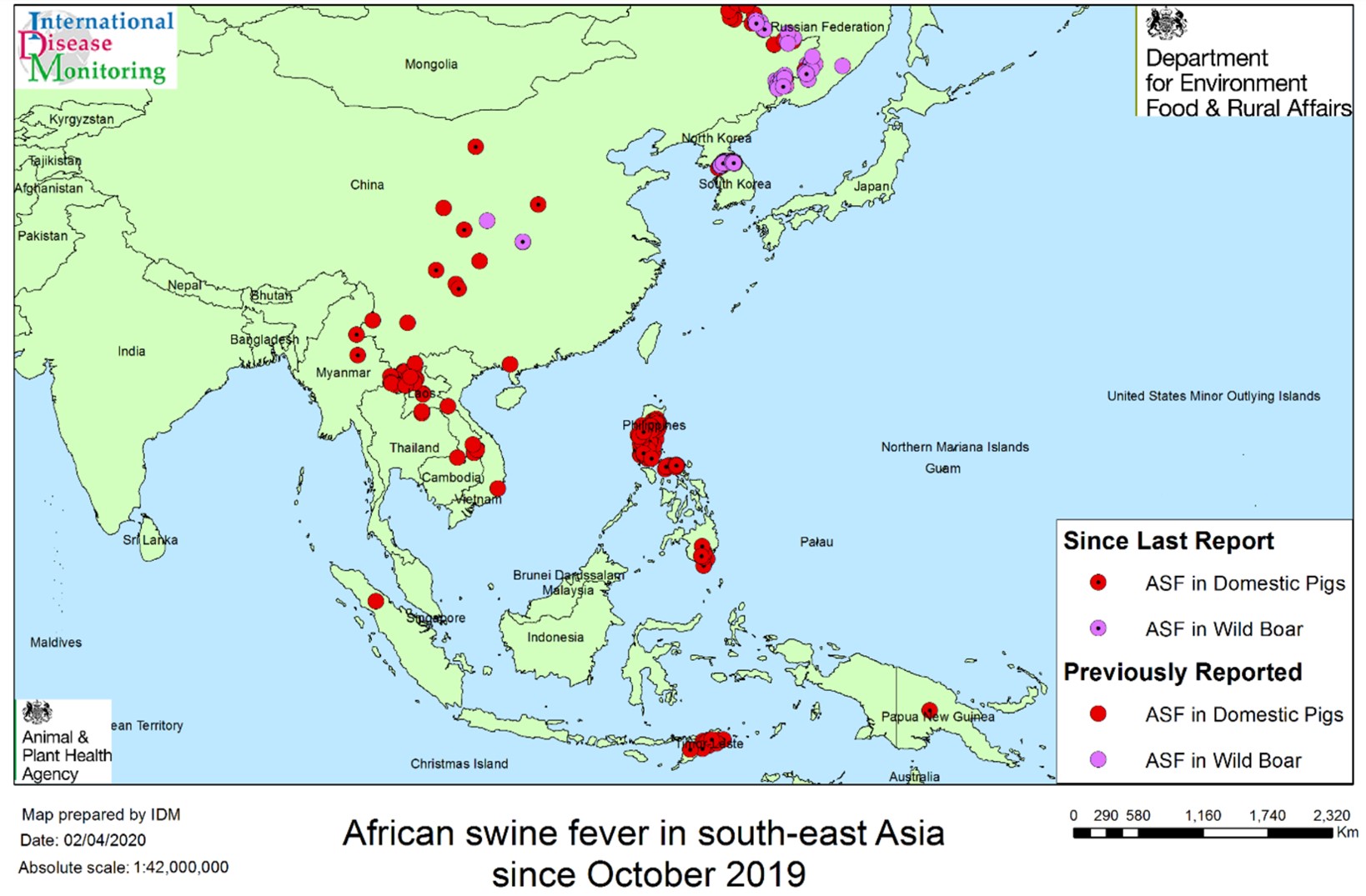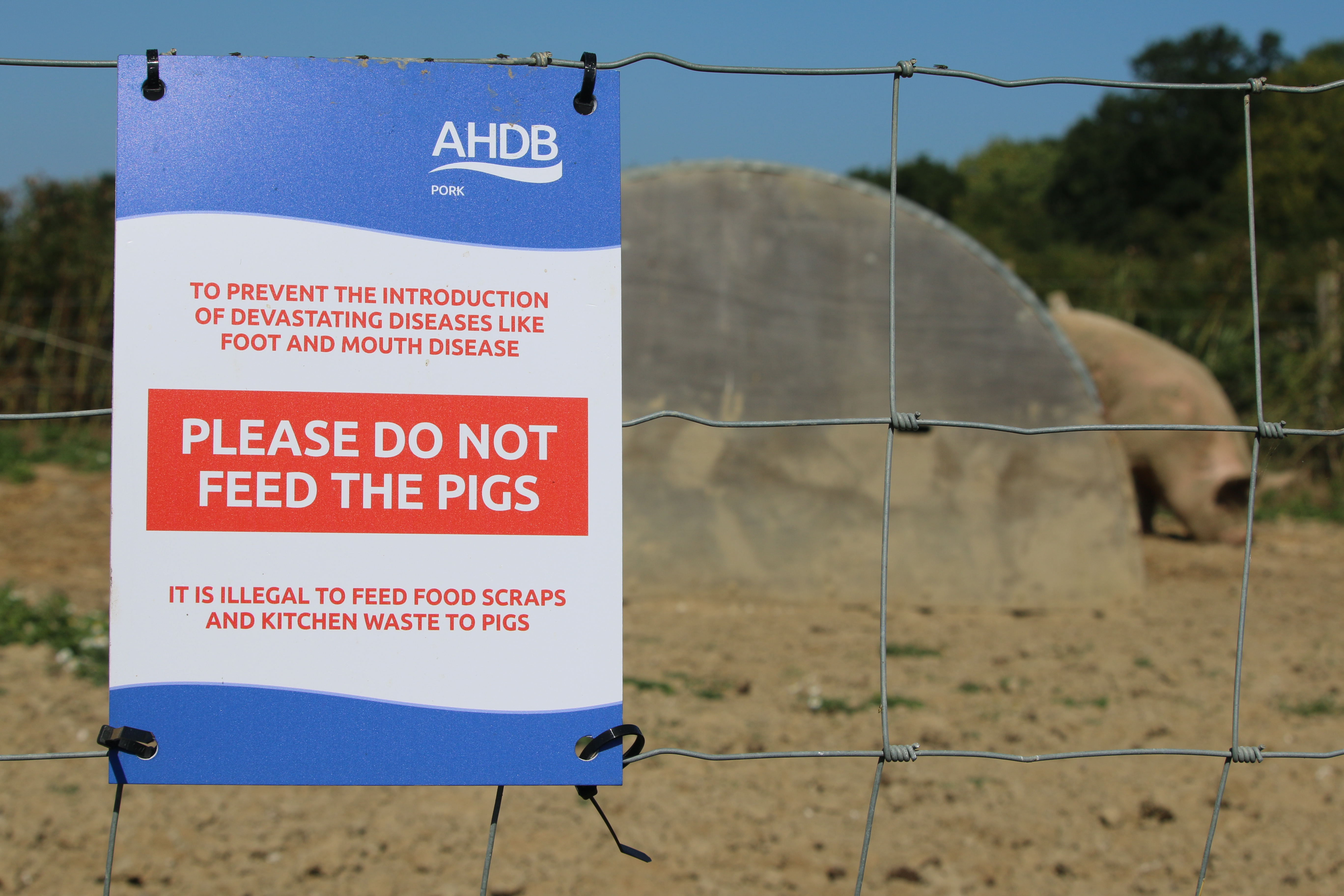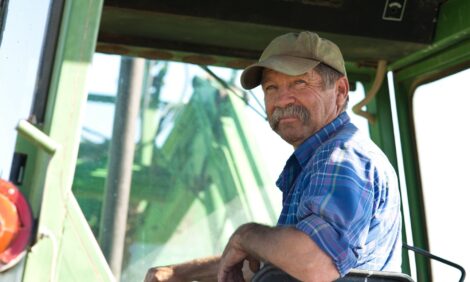



DEFRA provides latest update on African swine fever in South East Asia and Oceania
There have now been confirmed outbreaks of African swine fever (ASF) in most of South East Asia and the first cases in Oceania have emerged in the last week (1 April) in Papua New Guinea. In light of the new outbreaks, DEFRA has provided its latest ASF update.The Department for Environment, Food and Rural Affairs (DEFRA) - along with other animal disease monitoring institutions - has been documenting outbreaks of African swine fever (ASF) globally and providing regular updates as to the progress of each outbreak. Since August 2018, China has continued to register new outbreaks of the virus in both domestic and wild swine herds, with Myanmar, Thailand, Cambodia, Vietnam and the Philippines following very closely, with millions of pigs dying as a result. There have now been confirmed outbreaks in most of South East Asia and the first cases in Oceania have emerged last week (1 April) in Papua New Guinea. In light of the new outbreaks, DEFRA has provided its latest update, accessible online. Reported by DEFRA.

© DEFRA
Situation assessment
Papua New Guinea
Papua New Guinea reported four outbreaks of ASF for the first time on 30 March, after the deaths of 396 out of 700 free-ranging pigs, across four villages in Mendi Munihu (within the Southern Highlands) were reported on 11 March. The National Agriculture Quarantine and Inspection Authority (NAQIA) dispatched an investigating team and following post-mortem investigation and testing, samples were dispatched to the Australian Animal Health Laboratory (AAHL) on 20 March for confirmatory PCR testing. The AAHL confirmed the presence of ASF on 25 March. Control measures have been put into place; the provinces of Southern Highlands, Hela and Enga have been declared as disease areas, with restrictions in the movement of pig and pig products.
The Agriculture Minister for Papua New Guinea (PNG) is uncertain how the outbreak occurred, but it is possible that pigs may have eaten contaminated meat at a village dump (ABC, 2020). Investigations are continuing as to how the virus appears to have skipped the coastal areas and jumped into the Highlands. The Chief Veterinarian for PNG has reported that one possible cause was the transportation of imported canned food (The National, 2020).
This, the first report of ASF in PNG, highlights the increased risk to Australia, its closest neighbour. Australian Pork Ltd CEO has estimated that the potential costs of ASF incursion to Australia could be in excess of $2 billion (Australian Food News, 2020).
An ASF response package by the Federal Government (costing $66.6 million) is being implemented. This includes two new 3D X-Ray machines installed at Sydney and Melbourne mail centres (ABC, 2020).
South East Asia
China
In SE Asia, China has reported five new outbreaks in domestic pigs. Three were in Sichuan Province (two of these being at highway checkpoints for animal health), with additional outbreaks in Henan and Inner Mongolia. ASF continues to affect the Chinese pig population, home to over half the world’s pigs. There have been two additional cases of ASF in wild boar in Yangri and Songbai townships.
Philippines
The Philippines has reported a further 70 outbreaks in domestic pigs. While most have occurred in the north, there have been six outbreaks in the south (in Davao Del Sur). Since the beginning of the outbreak in August 2019, over 250,000 pigs have been culled. The government continues to apply disease control measures, including zoning and tracing. On 21 February the President signed an Executive Order to create a national task force to prevent and control animal diseases (FAO, 2020).
South Korea
There have been 271 new reports of ASF in wild boar in South Korea, with no new outbreaks in domestic pigs. Although this is an escalation, all cases in wild boar remain close to its border with North Korea, with robust control measures continuing to prevent further disease spread (Kim Tong-Hyung, Hyung-Jin Kim, 2019).
East Timor
In Timor-Leste (East Timor) there have been 126 outbreaks reported in domestic pigs. One hundred of these were in smallholder pig farms in Dili Municipality. Following its first outbreak last September a taskforce team was created, and there continues to be a movement ban of pig and pork products between districts (FAO 2020).
Two outbreaks on domestic pig farms have been reported in Myanmar (in Shan and Kachin states). After its first outbreak last August, the government and relevant stakeholders formulated a Myanmar Pork Industry Emergency Plan, its aim being to reduce losses and rebuild the industry, with modernisation seen as the best protection against ASF incursion (Swine Disease Global Surveillance Report, 2020).
Since our last report on 13 February, there have been no further outbreaks of ASF reported in North Korea, Cambodia, Hong Kong, Vietnam, Laos or Mongolia, though it is likely that the virus is still circulating in these areas. Taiwan remains officially free from ASF.
The confirmation of ASF in China, Mongolia, Vietnam, Cambodia, Hong Kong, North Korea, South Korea, Laos, Myanmar, Philippines, East Timor, Indonesia and (now) Papua New Guinea, and the wide geographic range within these countries, demonstrates the potential for further spread into and within the domestic pig and wild suid populations in south-eastern Asia and Oceania.
Publicity campaigns are in place in the UK to inform the public and discourage individuals from bringing pork products into UK, including targeted messages to key stakeholders such as road hauliers, hunters, pig keepers and veterinarians.

Conclusion
The risk of ASF introduction to the UK was raised to medium in August 2018 as a result of the number of outbreaks of ASF being reported in Eastern Europe, and subsequent detection of ASF in wild boar in Belgium in September 2018. The current risk of ASF introduction to the UK is still considered to be medium, despite the spread of ASF to China, Mongolia, Vietnam, Cambodia, Hong Kong, North Korea, South Korea, Laos, Myanmar, the Philippines, East Timor, Indonesia and Papua New Guinea.
The situation is being kept under review. Illegal importation of pork meat from affected parts of Asia, and now Oceania, presents a significant route of entry of ASFV to the UK. There are ongoing concerns around pork products from non-EU countries entering the EU in passenger luggage and then being discarded in areas where wild boar or domestic pigs could access them.
Given the current COVID-19 pandemic, direct flights to/from the EU and UK, and internationally, are either cancelled or running a very limited schedule. There is a risk of entry of ASFV in products of animal origin (POAO) from the affected regions in eastern Asia, however current travel restrictions may make introduction less likely.
We would like to highlight to all pig keepers and the public to ensure pigs are not fed catering waste, kitchen scraps or pork products, thereby observing the swill feeding ban. All pig keepers should be aware that visitors to their premises should not have had recent contact with pigs and pig premises in the affected regions. Anybody returning from any ASF-affected area should avoid contact with domestic pigs, whether commercial holdings or smallholdings, areas with feral pigs or wild boar, until they are confident they have no contaminated clothing, footwear or equipment.
Pig keepers and veterinarians should remind themselves of the clinical signs for ASF. Any suspect cases must be reported promptly.
We will continue to monitor the situation.






